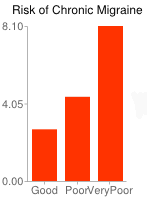Is This a way to avoid Chronic Migraine?
When the occasional migraine attacks turns into chronic migraine, you’ve got big problems. But why exactly does episodic migraine turn into something chronic? Is there a way to keep it from happening?
A study completed this summer may give us one answer to the question. Treating migraine properly early on may reduce the risk of chronic migraine down the road.
In this case, chronic migraine is defined as 15 or more attacks per month. Dr. Richard B. Lipton and his team used information from 4,625 people with episodic migraine to see who had good treatment, and who developed chronic migraine.
In this case, “optimized treatment” does not refer to someone’s opinion of which drug is best. Instead, it’s basically a measurement of how well the patient’s treatment is working for them. For example, is it actually improving your life by reducing migraine symptoms and allowing you to continue with your regular activities? Are there major side effects, or are you basically satisfied with the treatment?
 |
You can see the results on the chart to the right. People with good treatment (“maximal” or “moderate”) were at a lower risk to develop chronic migraine the following year than those with poor or very poor treatment. And 48% had poor or very poor treatment! As a matter of fact, those with very poor treatment were over 3x more likely to develop chronic migraine than those with maximal treatment.
Of those with the poorest treatment, 8.1% developed chronic migraine. That may not seem like a lot, but remember, this is just the following year. Over 8% becoming chronic in a year is pretty serious.
There is an important thing that this study does not tell us. Could it be that there are certain types of migraine that are simply resistant to treatment? And could these types of migraine be more likely to turn chronic?
In other words, two people may have the same excellent doctor, and try the same excellent treatment, but one may get chronic migraine and the other not – because of differences in the neurology, not the treatment itself.
That being said, we know that may people are simply not getting the good treatment that they should be getting. So to see a ridiculous 48% that are getting poor treatment is shocking and it should not be the case at all. There is better treatment available for a whole lot of these people.
Like any risk factor, it’s only one piece of the puzzle. Just because you’re not happy with your treatment does not mean you will develop chronic migraine – but your risk is high. And if you improve your treatment, you still may get chronic migraine. There are other risk factors at play.
If your disease is simply resistant to treatment, the only thing you can do is keep trying.
However, if you’re simply taking painkillers and not seeking proper migraine treatment, you need to start. Once again, migraine is serious, and can get more serious if you don’t take it seriously.
So don’t shrug it off as “just a headache I have to suffer through”. And if your doctor isn’t taking it seriously, find a new doctor. Getting proper treatment early on can keep you from having a much worse problem down the road.
via: Keep Episodic Migraine From Progressing to Chronic
Study overview: Suboptimal Treatment of Episodic Migraine May Mean Progression to Chronic Migraine

27 September 2013 @ 8:58 pm
I dispute this because I’m am a chronic migraineur. This did not happen because of poor treatment. I saw some of the best headache specialists in the country. No name droppers but a couple were Silverstein and Young at Jefferson/Phila. I had tried over 63 different medications for preventative and many for abortive. Nothing worked. I have done many treatments since then. I don’t know where else I could have gone ie Michagan, Diamond etc. no one could help me and that scenario is still going on. So how do u blame that on poor treatments? I’m just as puzzled as the specialists, but that doesn’t leave me any better off. We need more research and God help us we need to find a cure. Hanging on with a prayer, and I say that literally! Thx for listening.
3 October 2013 @ 12:04 pm
something worth trying
8 October 2013 @ 11:51 pm
I had just started having occasional migraines when, for other reasons, I had to stop eating gluten. It was a pleasant surprise that my migraines went away and never returned.
8 October 2013 @ 11:52 pm
I am 3 years migraine- and gluten- free now.